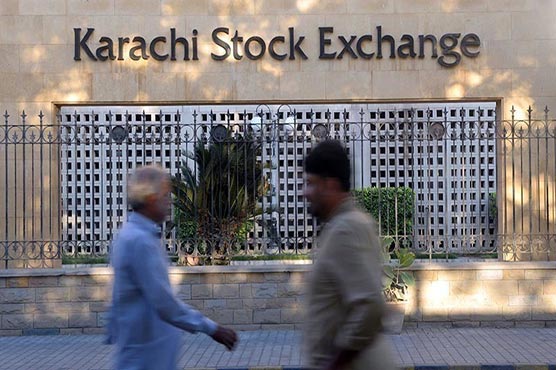Stocks edge down in intra-day trading

The market opened at 39,218.73 today, and closed at 39,199.68 yesterday.
KARACHI (Dunya News) – The stock market on Wednesday has been observing bearish trend as panic and uncertainty continues to grip investors.
The benchmark KSE-100 Share Index dropped 293.28 points and reached 38,906.40 as of 03.41pm. The market opened at 39,218.73 today, and closed at 39,199.68 yesterday.
Adopting a negative trajectory for the latest session, the apex of the day remained 39,262.55 and 38,762.44, the lowest so far.
According to experts, the stock market has been searching for a proper direction for healthy growth but several factors continue to dominate the sentiments of potential investors.
On Monday, the momentum was generated in the market as investors continued to relish windfall gains to the economy in the form of declining oil prices; squeeze in trade deficit by 27pc during 8MFY20 and lower-than-expected inflation numbers for February over the earlier month, raising hopes of an early cut in interest rates by the State Bank of Pakistan (SBP).
The positive change was also supported by the decline in certain inflation rates, petroleum product prices, and positive effects of the Afghan peace deal in the region.
Southeast Asian stocks fall
Most Southeast Asian stock markets slipped on Wednesday, tracking Wall Street as a surprise rate cut by the U.S. Federal Reserve failed to allay fears over the coronavirus’s impact, while dismal China economic data dented sentiment as well.
The Fed lowered interest rates by 50 basis points on Tuesday, its first out of cycle cut since 2008 at the height of the financial crisis, in a bid to shield the world’s largest economy from the impact of the virus.
The cut sent Wall Street sharply lower as investors worried about whether putting more money in the economy would help disrupted supply chains and weak consumer confidence.
The move was upended by "worries about the depth and duration of negative economic ripples from COVID-19 impact; doubts about efficacy of rate cuts, and lack of details on transmission/credit relief measures", Vishnu Varathan, a senior economist at Mizuho Bank, said in a note.
Further hurting sentiment, data showed China’s services sector had its worst month on record in February as new orders plummeted to their lowest since the global financial crisis.
Financials in Singapore and Thailand were the worst hit after Fitch Ratings on Tuesday said banks in tourism-dependent
Thailand and China-exposed Singapore would be the most affected in the region amid the virus outbreak.
Thai stocks fell more than 1.2% after the previous session’s sharp gain, with Bangkok Bank Pcl and Bank of Ayudhya Pcl shedding more than 1% each.
Singapore shares declined as much as 0.6%, dragged by top lenders including United Overseas Bank Ltd and DBS
Group Holdings Ltd.
Philippine shares shed more than 1%, hurt by consumers and industrials. Universal Robina Corp and JG Summit Holdings Inc fell nearly 4% each.
Meanwhile, Indonesian equities gained as much as 2% to hit their highest since Feb. 27, on expectation of a second policy package to help repair supply chains that have been disrupted by the spread of the virus.
Malaysian shares climbed nearly 0.5%, helped by financial and telecom stocks.
Data showed January exports dropped 1.5% from a year earlier, marginally better than the 1.6% fall forecast by analysts surveyed in a Reuters poll.

